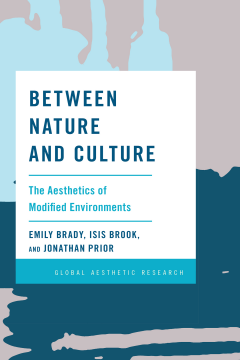
Additional Information
Book Details
Abstract
Within philosophy, a new interest in aesthetics beyond the arts has encouraged the rapid growth of environmental aesthetics. Within this literature, however, less attention has been given to the spaces and places that emerge from various nature-culture interactions. This has meant the relative neglect of types of environments to which the majority of people have access, and interact with, in a sustained manner. In this respect, these are the environments in which many of us understand and value nature. Through a greater understanding of how humans interact with these environments and the types of relationships that emerge through this interaction, we address seek to address this gap.
Between Nature and Culture provides a systematic, philosophical account of the main issues and problems that pertain to the aesthetics of modified environments, as well as new insights concerning the generation and appreciation of landscapes and environments that fall between (non-human) nature and (human) culture, including gardens, agricultural and ecologically restored landscapes, and land and ecological art works.
Between Nature and Culture: The Aesthetics of Modified Environments is a masterpiece. Clear and well-expressed, the book’s philosophy is optimistic and admirable, and reminds me of the early writings of transcendentalists such as Henry David Thoreau.
Jai Syvitski, Professor, Department of Geological Sciences, University of Colorado Boulder
This timely and carefully-argued book addresses the various ways that aesthetic value can be created by working with nature. In so doing, it sheds new light on the aesthetic and ethical significance of a wide range of practices, from topiary to stonewalling and from land art to the restoration of post-industrial landscapes. I highly recommend it.
Simon Paul James, Reader in Philosophy at Durham University; Member of Durham Centre for Ethics and Law in the Life Sciences
A welcome collaborative effort that examines both mainstream and quirky instances of modified natural environments, proposes proper modes of aesthetic appreciation for such sites, and urges an ethical stewardship that foregrounds caring for the natural world we inhabit.
Stephanie Ross, Professor of Philosophy, University of Missouri, St Louis
In contrast to much of the major work in environmental aesthetics, Between Nature and Culture focuses on the aesthetic potential of modified environments, such as gardens and agricultural landscapes, where the land is intentionally modified to suit human needs and purposes. The book is an excellent introduction to this important area of research as well as a deep discussion of its major themes. It will be an essential source for scholars and a fascinating read for anyone interested in the aesthetic appreciation of the environments in which, as the authors note, most of us spend most of our lives.
Allen Carlson, Professor Emeritus, Department of Philosophy, University of Alberta
Emily Brady is Professor of Philosophy and Director of Glasscock Center for Humanities Research at Texas A&M University. She works in the areas of aesthetics and philosophy of art, environmental ethics, environmental humanities, and animal studies. She has published widely in aesthetics and environmental philosophy, and her most recent book is The Sublime in Modern Philosophy: Aesthetics, Ethics and Nature (Cambridge University Press, 2013).
Dr Isis Brook is Head of Faculty and Senior Lecturer at Crossfields Institute International. She has held philosophy lectureships at Lancaster University, where she also served as a Faculty Teaching Dean, and the University of Central Lancashire. Her research and publications range across aesthetics, environmental ethics, and phenomenology. She is especially interested in responses to gardens and landscapes, and how these responses can be made more sensitive and ultimately shape who we are.
Dr Jonathan Prior is Lecturer in Human Geography at Cardiff University. His research and publications take an interdisciplinary approach, spanning environmental philosophy, sound studies, and landscape research. He is interested in the relationship between environmental values and the production of environmental policies, as a means to understand what motivates and underpins different ways of conceptualising the more-than-human world when humans seek to implement conservation, ecological restoration, or environmental management strategies.
Until recently, environmental aesthetics was preoccupied with wild or ‘unmodified’ nature. Since the environments we engage with most – like gardens and farmland – are decisively modified by cultural practices, a book on the aesthetics of such environments is especially welcome. The authors provide clear, informed and closely argued discussions of topics that range from topiary and monocultural farming to landscape restoration and environmental art. Their book will surely help to widen the horizons of environmental aesthetics.
David E. Cooper, Emeritus Professor, Department of Philosophy, Durham University
Table of Contents
| Section Title | Page | Action | Price |
|---|---|---|---|
| Between Nature and Culture | Cover | ||
| Contents | vii | ||
| Acknowledgments | ix | ||
| List of Figures | xi | ||
| 1 Introduction: Environmental Aesthetics between Nature and Culture | 1 | ||
| 2 Gardens I: The Picturesque and Engagement with Nature | 13 | ||
| 3 Gardens II: Ethics, Aesthetics, and Topiary | 29 | ||
| 4 Agricultural Landscapes | 45 | ||
| 5 Environmental, Land, and Ecological Art | 67 | ||
| 6 Ecological Restoration | 87 | ||
| 7 Conclusion: Aesthetics and Ethics between Nature and Culture | 105 | ||
| Bibliography | 113 | ||
| Index | 127 | ||
| About the Authors | 131 |
